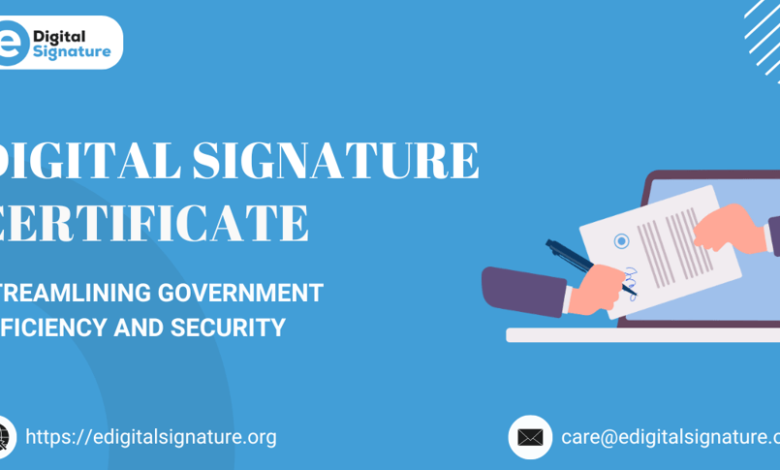Digital Signature Certificates: Streamlining Government Efficiency and Security

Digital Signature Certificates (DSCs) are revolutionizing the way governments operate, fostering a more efficient, secure, and transparent environment. This digital equivalent of a physical signature offers a multitude of benefits for government agencies, citizens, and businesses alike.
Understanding DSCs in Detail
A DSC functions as a tamper-proof electronic seal that verifies the authenticity of an individual or organization in the digital realm. It is issued by a licensed Certifying Authority (CA) after rigorous identity verification procedures. This certificate contains the holder’s public key, which can be used to verify the digital signature created using the corresponding private key. The private key is a confidential piece of information used to digitally sign documents, and the public key is used to verify the authenticity of those signatures. This cryptographic process ensures that only the authorized individual with the private key could have signed the document.
There are typically three classes of DSCs available, each offering varying levels of security and validation requirements. Class 1 DSCs are suitable for low-risk transactions like online registrations. Class 2 DSCs require physical verification of the applicant and are commonly used for the e-filing of taxes and tenders. Class 3 DSCs offer the highest level of security and involve stringent verification procedures, making them ideal for signing high-value government contracts and land records.
Benefits of DSCs for Government Purposes: A Deeper Dive
Enhanced Security:
Beyond document integrity, DSCs also offer non-repudiation. This means that the signer cannot deny having signed the document after the fact. This provides a strong legal framework for e-governance initiatives.
Improved Efficiency:
DSCs not only expedite document submission and processing but also eliminate the need for physical document storage. This frees up valuable office space and allows for easier document retrieval and management.
Greater Transparency:
A transparent audit trail with timestamps for each digital signature creates a clear record of document activity. This fosters accountability and allows for easier tracking of approvals and modifications. Citizens can also access this information for greater transparency into government processes.
Accessibility and Convenience:
Citizens and businesses can access government services 24/7 from any location with an internet connection. This is particularly beneficial for those in remote areas or with limited mobility.
Cost Savings:
Transitioning from paper-based systems to a digital ecosystem using DSCs reduces printing, storage, and document handling costs. Additionally, faster processing times through online submissions lead to increased productivity and overall cost savings for the government.
Specific Applications in Government with Examples
E-Procurement: During e-procurement, bidders submit bids electronically with a digital signature using their DSCs. This ensures the authenticity of the bidder and the bid itself. The government can then securely access, verify, and evaluate bids, leading to a fair and transparent bidding process.
E-filing of Taxes and Returns:
Citizens and businesses can use DSCs to electronically file tax returns and other government forms. This streamlines the process, reduces errors, and expedites tax collection for the government. For instance, India’s Income Tax department allows e-filing of returns using a Class 2 DSC.
E-governance Initiatives:
DSCs play a crucial role in various e-governance initiatives. They facilitate online issuance of licenses (e.g., driving licenses), permits (e.g., construction permits), certificates (e. g., birth certificates), and other documents. This offers citizens convenient access to government services without the need for physical visits.
Land Record Management:
Land records are critical documents that are prone to forgery and fraud. Using DSCs for digital signing and secure storage of land records can prevent these issues. This ensures the integrity of land ownership data and simplifies land transaction processes.
Citizen Authentication:
DSCs can be used for citizen authentication purposes, allowing for secure access to government online portals and services. For example, some countries use DSCs to allow citizens to access online social security benefits or medical records.
Read also: IEC Registration for Freelancers: A Comprehensive Guide to Freelance Exporters
Implementation Considerations: Challenges and Solutions
While DSCs offer numerous benefits, successful implementation requires careful consideration of several challenges and potential solutions:
Infrastructure Development:
A robust digital infrastructure is necessary for the smooth functioning of DSCs. This includes reliable internet connectivity, secure servers with adequate capacity, and user-friendly online platforms for document submission and verification. Governments may need to invest in upgrading their digital infrastructure to support widespread DSC adoption.
Public Awareness:
Creating public awareness about DSCs and their benefits is crucial for widespread adoption. Government agencies can conduct public education campaigns through various channels, including television, radio, social media, and community outreach programs. Additionally, user-friendly tutorials and guides on obtaining and using DSCs can be made available online.
Also, Read Digital-Signature-Certificate-for-Income-Tax-Return
Conclusion
Digital Signature Certificates hold immense potential to transform the way governments function. By embracing this technology and addressing the associated challenges, governments can create a more efficient, secure, and transparent environment for their citizens and businesses. As digitalization continues to reshape societies, governments that invest in robust DSC infrastructure and promote public awareness will be well-positioned to reap the full benefits of this transformative technology.






